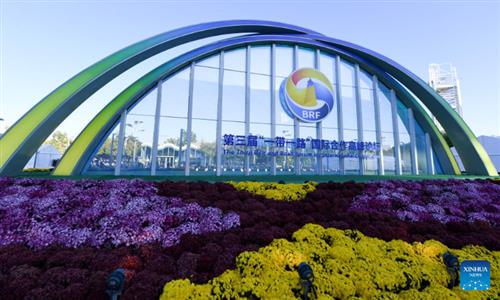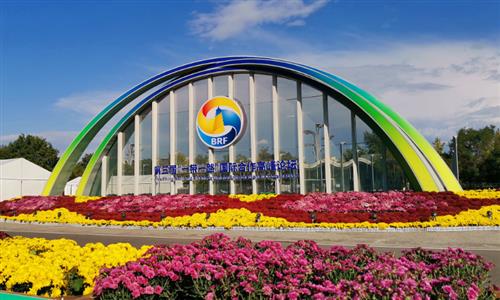BRI is of historic importance, cherishing cooperation, integration, shared peace and growth

Illustration: Tang Tengfei/Global Times
It's an event of historic importance and significance for more than 20 heads of state and scores of business leaders to gather in Beijing to celebrate the 10th anniversary of the Belt and Road Initiative (BRI). Through promoting the ancient Silk Road spirit of peace, connectivity, cooperation and inclusive growth, the giant initiative is expected to be welcomed in more lands and usher in more tangible results in the coming decade.Now more than 150 countries, accounting for more than 70 percent of the world's population and half of the world's GDP, have signed on to the BRI framework - a global network of connectivity consisting of economic corridors, international transportation routes and an information highway that boosts the flow of goods, capital, technologies and human resources among the partnering countries.
The World Bank estimates that by 2030, the BRI is likely to generate $1.6 trillion in economic revenue each year, or 1.3 percent of the annual global GDP. Hundreds of mushrooming transport corridors and sprawling economic zones have the potential to substantially improve trade, investment and living conditions for billions of people in the partner countries.
These demonstrate that peaceful development and win-win cooperation conform to the general trend of the times and people's aspirations, while Cold War confrontation and "decoupling" attempt, and fragmenting the global connectivity are against the tide of history, and are doomed to fail.
The journey of the BRI is not a finished tale yet, but a blueprint still in the making, which will be a true testament to the unrelenting spirit of human cooperation and progress. The initiative serves as a catalyst for economic development and shared prosperity for all by championing multilateralism.
A significant number of iconic projects, including the Mombasa-Nairobi railway, the China-Laos railway and the Jakarta-Bandung high-speed railway are completed and operational, which will help turbocharge developing economies. In the past years, Chinese companies have doled out hundreds of billions of dollars in loans and grants for railways, roads and other infrastructure projects in BRI that might otherwise have gone unfunded. The projects have spanned the globe, from Laos to Kenya to Argentina.
What the BRI illustrates is categorically the opposite of the US government's attempt to "decouple," split and separate the world, which is trying to prolong its own dominance and perpetuate its sole prosperity. However, viewing other's development as a threat or taking economic interdependence as a risk won't make one's life better.
Like its ancestor Silk Road, the BRI embodies the distinctive spirit of peace and cooperation, openness and inclusiveness, mutual learning and mutual benefit. It transcends differences between civilizations, cultures, social systems, and stages of development. Cooperation is the most important source of strength for the Belt and Road, and the key to the initiative's success.
During the third high-note BRI forum in Beijing, cooperation agreements worth $97.2 billion of new projects were inked, which is a clear manifestation of the initiative's magic prowess. As connectivity has become a defining feature of a modern economy, it is evident that connectivity needs impetus, planning and proper implementation. The Belt and Road Initiative helps make those connectivity goals to become true.
At the just-concluded forum, China's top leadership called for deepening high-quality Belt and Road cooperation to build an open, inclusive and interconnected world for shared growth, while warning against unilateral sanctions, economic coercion and decoupling, and supply chain disruption by the US.
China plans to set up financing windows totaling 700 billion yuan ($95.8 billion) through two development banks to support projects involved in the BRI, while an additional 80 billion yuan will be injected into the Silk Road Fund to promote BRI cooperation. The China Development Bank and the Export-Import Bank of China will each set up a 350 billion-yuan financing window. Together, they will support BRI projects on the basis of market and business operation.
Beijing also announced a raft of major steps that China will take to support joint pursuit of high-quality Belt and Road cooperation, including efforts to build a multi-dimensional Belt and Road connectivity network, support construction of an open world economy, promote green development and advance scientific and technological innovation. Based on the principle of "planning together, building together and benefiting together", Belt and Road cooperation has extended from the Eurasian region to Africa and Latin America.
In the US and its hardcore allies, too many so-called leaders always say nice words that people want to hear, but few deliver on their pledged "hollow" promises they make to lure the people - mostly for election votes. Sadly, when the world is facing horrendous challenges like the climate change, public health hazards, poverty and war, the US and its allies have chosen confrontation over cooperation.
But China is different. The BRI which China proposed in the first place offers a proper lends to see Beijing's approach to global development and Chinese efforts to build a human community with a share future for mankind.
Despite the naysayers about Chinese economy since the start of this year, China's GDP in the first three quarters grew by an impressive 5.2 percent. Increasingly, China's BRI partners are to gain more benefits from interacting and integrating with China's giant economy, as evidenced by the booming ASEAN economy which is increasingly integrated with China's.
Multilateral cooperation and globalization have helped raise growth rates and pull tens of millions of people out of poverty in the world. Now, economic fragmentation headed by the US is eating away at the fruitful results of globalization. The visionary leaders in Asia, Africa, Europe, Latin America and elsewhere have come to know the difference of Chinese and American decision-making. International relations should never be defined by the US-style zero-sum games or bullying the "temporary poor and weak."
The author is an editor with the Global Times. bizopinion@globaltimes.com.cn



